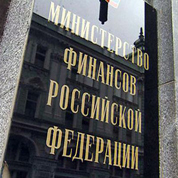Finance Ministry clarifies the official bonds placement policy in 2010

Russian Deputy Prime Minister and Finance Minister Alexei Kudrin, speaking at the sidelines of the 2010 Davos World Economic Forum in Switzerland, said the Russian government will issue sovereign debt securities worth $17.8bln in 2010. The timetable for the bonds placement is at the stage of finalization as the government will be ready by March 2010 to seek foreign loans through issuance of sovereign debt instruments on the international capital markets, specifically, the eurobonds market, the first time since the 1998 crisis, the minister added.
Elaborating on the official plans, Kudrin, who has assessed the interests of foreign investors in Russian sovereign debt bonds as ‘very high,’ noted that the bonds issuance will be done in parts, the first of which, estimated at $3bln to $5bln, could take place in the first half of 2010. “We plan to place bonds in favorable market conditions throughout the year,” said the finance minister, noting that, going by the latest official macroeconomic forecast, the government intends to tap the maximum limit on loans and use it to the fullest. “The amount to be obtained from the eurobonds placement will be used to offset the growing deficit in the state budget, which is expected to reach about 6.8% by the end of 2010.
Airing a similar view at the Russia-2010 Forum, which was organized in Moscow in February by the Troika Dialog investment bank, Russia’s Deputy Finance Minister Dmitry Pankin made it clear that the government’s decision to issue sovereign bonds in 2010 was final, and that all that now remains to be done is to determine the exact amount, the currencies and markets for placing the bonds in order to secure the maximum benefits from the policy. “The exact amount to be borrowed via this policy will depend on the oil prices and dynamics of the changes in the Russian economy in 2010. Today, it is difficult to predict the exact sum, which could be as high as $10bln-$12bln or any other figure,” he added. The deputy finance minister also noted that, as an alternative option, the Finance Ministry, instead of going to the international capital markets, could choose to issue ruble instruments on the domestic market. “The Finance Ministry, all things being equal, will always prefer sovereign debts denominated in its national currency. This is especially more so today, when there is a considerably high demand for ruble-denominated instruments,” he added. “Besides, we are of the opinion that the annual interest rates on ruble-denominated securities are more preferable for our country.”
“Russia certainly cannot do without borrowing, just as it cannot do without the latest technologies and other vital resources that it needs for the modernization of its economy.”
Pankin specifically noted that the exact amount and the precise time for seeking foreign loans via the issuance of sovereign bonds will depend on the general dynamics of oil price changes and the stability of world currencies’ exchange rates to the ruble throughout 2010. Here, it is of particular importance to note that the oil prices are currently above the average annual price of $58 per barrel forecast in the budget for 2010. However, the local currency is appreciating, a worrying trend that could adversely impact on the overall generation and growth of revenues in the state’s treasury. “This ruble appreciation trend will certainly lead to a situation, where the revenues going into the national budget will become considerably much lower than anticipated by the government. At the same time, one can hardly expect the adopted budgetary expenditures to reduce significantly or proportionally.”
The objective and the purpose of the funds to be raised by the Finance Ministry via the placement of government’s sovereign securities are of strategic importance to the country. This is because, apart from being used to offset the growing budget deficit as already noted above, another reason —forcing the government to seek loans from international capital markets — is the urgent necessity to quickly raise extra funds that will be required to finance the processes of modernization of the economy and setting it on a new innovative growth path. In this context, Russia certainly cannot do without local or international borrowing because the government needs money to secure the latest technologies and other vital resources required for the modernization of its economy. “Therefore, there is no doubt that some forms of financial borrowing will be needed because we cannot locally produce everything that has been invented in the world. Besides, such option — trying to everything locally and without borrowing — is the longest and most expensive way to achieve our modernization goals,” he noted. “Consequently, we need to move in two directions: borrow the latest technologies and create new products, while training the best specialists and financing researches and developments.”
However, the government does not intend to remain on the sovereign bonds markets longer than necessary for it to achieve its stated goals. “The Russian government intends to quit the foreign bonds markets in five years’ time, while private companies will always need such external sources of funds to bankroll their operations and other needs,” he said. “This is because private companies regard such capital resources as a key tool for modernization of their businesses.”












 Web design,
Web design,